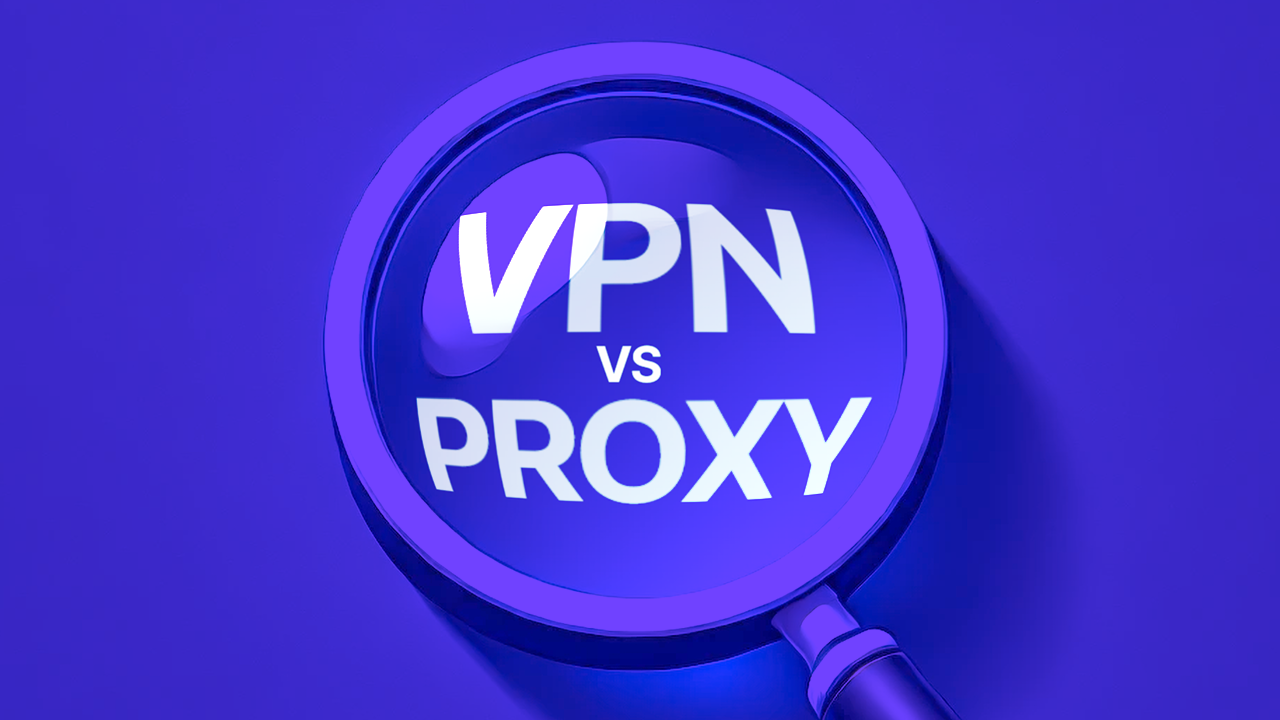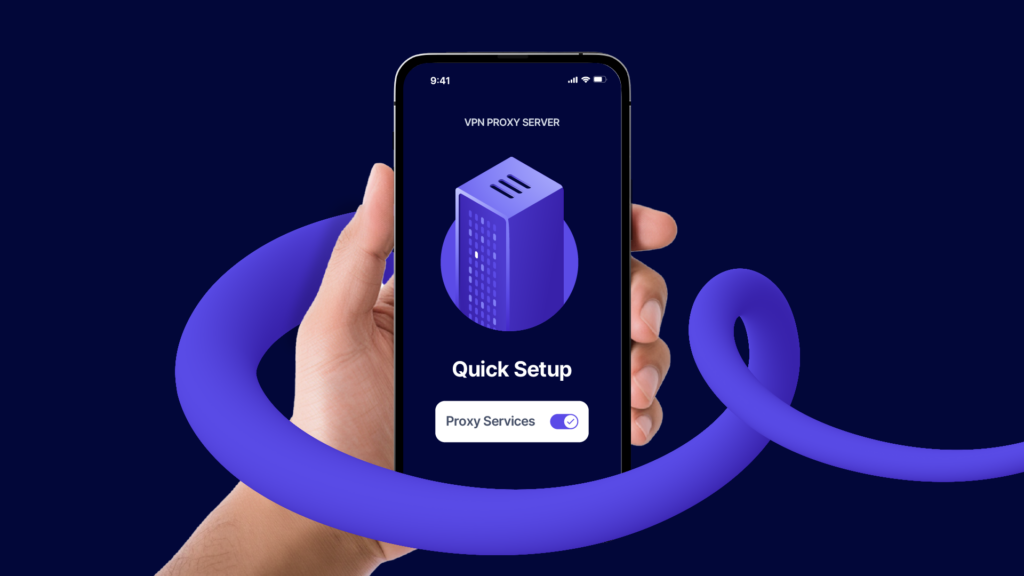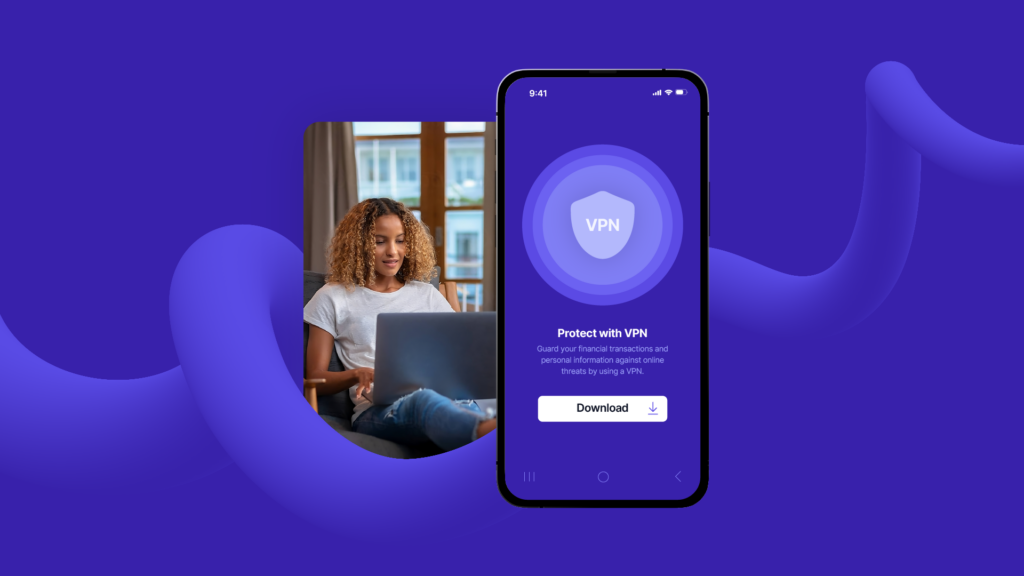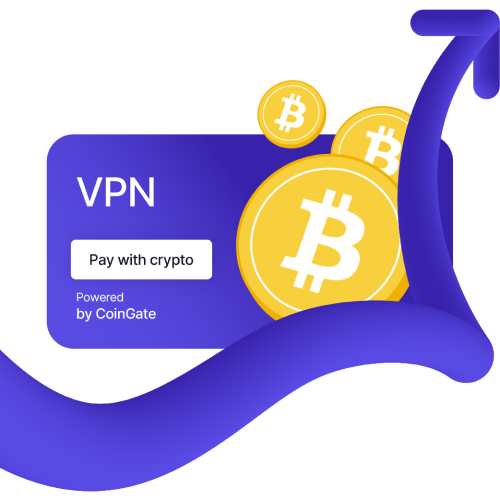
Accept crypto with CoinGate
Accept crypto with confidence using everything you need in one platform.
The Difference Between Proxy and VPN

When comparing VPN vs Proxy, we can see why people might confuse them. They got many similarities, like for example, both, Proxy and VPN servers both work to mask user identities and enable secure access to content, often leading to confusion and interchangeable use of terms.
However, while one truly safeguards your privacy, the other might fall short. VPN vs proxy — how are they different and which one is best for you?
What’s the Difference Between a Proxy and a Virtual Private Network?
Both a VPN and a proxy server offer services that hide your IP address by rerouting your internet traffic through a remote server.
The key difference is that a proxy works only with a single app or service, while a VPN secures all your internet traffic and encrypts it for extra security and privacy.
When you connect to a VPN or proxy, your IP address is hidden and replaced with the IP address of the remote server. However, only a VPN will redirect your internet data through an encrypted tunnel, keeping your online activity private.
A proxy is suitable for simple tasks like browsing the internet, but it won’t provide the level of security and advanced features that a VPN offers.
This article will highlight the key differences between proxies and VPNs, discuss their general advantages and disadvantages, and explain when you should use one over the other.
By the end, you’ll know which tool is best suited for your needs and how they can help protect your online privacy.
What is a Proxy Server?

Let’s start with the basics: what is a proxy server?
Imagine you want to send a letter to a friend, but you don’t want your friend to know it’s from you. So, you give the letter to another person who sends it for you. In this way, your friend receives the letter, but the sender’s address isn’t yours—it’s the address of the person who sent it to you. That’s pretty much how a proxy server works for your internet connection.
A proxy server is like that middleman. When you use a proxy, your internet requests (like visiting a website) go through this server first.
The proxy server sends the request on your behalf, and then it sends the response back to you. This means the website you’re visiting doesn’t see your real IP address—it sees the IP address of the proxy server.
Here’s how to set up a proxy server quickly.
Types of Proxy Servers
Now, let’s talk about the different types of proxies. Think of proxies like different modes of transport—you’ve got bikes, cars, and buses, and each has its own uses and benefits. Here are some common types of proxies:
- HTTP Proxies: These are like bikes. They’re great for lightweight tasks like browsing the web. If you’re just looking to visit websites, an HTTP proxy is a simple and effective choice.
- SOCKS Proxies: Think of these like cars. They can handle more than just web traffic, like when you’re using apps or playing games online. They’re more versatile than HTTP proxies.
- Transparent Proxies: These are like buses. They don’t hide your IP address or the fact that you’re using a proxy. They’re often used in schools or workplaces to monitor and control internet usage without keeping it a secret.
How Proxies Work
Let’s dig a little further into how proxies actually work. Remember that middleman we talked about? Here’s what happens in more detail:
- IP Address Masking: When you connect to a website, your IP address (your internet ‘home address’) is usually visible to that site. A proxy masks your real IP address by replacing it with its own. So, it’s like sending a letter with a return address that isn’t yours.
- Intermediary Server: The proxy server acts as an intermediary or a ‘go-between’. When you send a request to access a website, the proxy server receives it first. It then forwards your request to the website. When the website responds, the proxy server sends the response back to you. This extra step helps hide your identity and can sometimes speed up your browsing if the proxy server has cached (saved) a copy of the website.
So, to piece it all together; Proxies help you surf the internet by acting as a middleman that hides your real IP address. This makes your online actions more private and more efficient.
Recommendations for Proxy Services

When choosing a proxy service, it’s important to consider factors such as reliability, speed, and security features. Here are some of the top proxy services available that excel in these areas:
- Froxy: Froxy offers a wide range of proxies with extensive global coverage. It is particularly noted for its user-friendly interface and flexible pricing plans, making it suitable for both beginners and advanced users.
- SmartyProxy: Known for its high-speed proxies and excellent customer support, SmartyProxy is a great choice for businesses and individuals who need reliable and fast connections for tasks like web scraping and bypassing geo-restrictions.
- ProxyScrape: This service provides a large pool of proxies that are updated regularly. ProxyScrape is ideal for users who require a variety of IP addresses for tasks such as data mining and online anonymity.
- Ghostealth: Ghostealth stands out for its focus on privacy and security. It offers robust protection features that ensure your online activities remain private, making it a solid option for users concerned about anonymity.
- Geonode: Geonode is known for its scalable proxy solutions that cater to both small businesses and large enterprises. Its proxies are optimized for performance, making it an excellent choice for accessing geo-blocked content and managing multiple accounts.
For added convenience and privacy, many of these top proxy services allow you to purchase their subscriptions using cryptocurrencies.
To explore these proxy services and make a purchase using cryptocurrencies, click the following link to learn everything you need about how to buy proxy with Bitcoin and cryptocurrencies.
Advantages of Using Proxy
When it comes to choosing between a VPN or proxy server, it’s good to know right from the start that proxies have several great advantages.
Speed and Performance for Specific Tasks
One big advantage of using a proxy is its speed and performance, especially for specific tasks like web scraping.
Imagine your business needs to collect a large amount of data from different websites quickly. A proxy can help by acting like a super-efficient assistant that fetches all the data for you faster than you could do it yourself.
Because proxy service providers may have a more direct connection to the websites you’re accessing, they can speed up the process significantly, making your data collection more efficient and allowing your business to operate more effectively.
Accessing Geo-Blocked Content
Proxies are also great for accessing geo-blocked content.
Have you ever tried to watch a video or visit a website only to find out it’s not available in your country? That’s called geo-blocking, where content is restricted based on your location.
A proxy can help you get around this.
It’s like having a friend in another country who lets you borrow their address to access the content. When you use a proxy server in the desired location, it makes it seem like you’re browsing from there, allowing you to access the blocked content.
Lower Cost Compared to VPNs
Proxies offer essential privacy and access benefits without the higher price associated with VPNs. This makes them an attractive option for those who do not require advanced security features.
Security
Proxy servers play a crucial role in providing a safe and secure connection to access the internet. They can act as a shield that protects you from hackers and cyber-attacks. By using a proxy, you can prevent data breaches and minimize security risks.
Filtering
Proxy servers enhance internet performance through caching, which saves the content of frequently visited websites. This process ensures quicker load times and a more efficient browsing experience by accessing stored copies rather than fetching new data from the internet repeatedly.
Privacy
Privacy is another significant advantage of using proxy servers. They allow you to browse the internet anonymously by providing alternate IP addresses. It’s like wearing a mask online—your real identity (IP address) is hidden, and you can explore the web without revealing your true location. This helps protect your personal information and keeps your online activities private.
Monitoring
Organizations often use proxy servers to log and monitor network traffic. Think of it like a security camera for internet use within a company. It keeps track of all the data going in and out, which helps identify any unusual or unauthorized activities.
This monitoring capability ensures that the network remains secure and helps maintain compliance with organizational policies.
Controlling Internet Usage
Proxy servers are also useful for controlling internet usage. For example, parents can use proxies to limit internet access for their children, ensuring they only visit safe and appropriate websites.
Similarly, organizations or businesses can use proxy servers to control the amount and level of internet access employees have, ensuring that they stay productive and don’t spend too much time on non-work-related sites.
Disadvantages of Using a Proxy
While proxy servers offer various benefits, it’s also important to understand their limitations when it comes to making an informed decision when it comes to proxy vs VPN.
Lack of Encryption and Lower Security
One major drawback of using a proxy is the lack of encryption.
Unlike VPNs, which encrypt all your internet traffic, proxies do not provide this level of security. This means that the data you send and receive through a proxy can be more easily intercepted by cybercriminals or other malicious actors.
If you’re dealing with sensitive information, the absence of encryption can leave you vulnerable to data breaches and hacking attempts.
Limited Anonymity
Although proxies can mask your IP address, they do not offer the same level of anonymity as VPNs. Proxies only hide your IP for specific applications or websites, not for your entire internet connection.
This partial anonymity means that other activities on your device could still expose your real IP address. Furthermore, sophisticated tracking techniques can sometimes bypass the proxy, revealing your true identity and location.
Potential for Logging and Data Interception
Another significant disadvantage of using a proxy is the potential for logging and data interception by the proxy server itself.
Some proxy providers may log your internet activities, which can then be accessed by third parties, including advertisers, government agencies, or even hackers.
This logging undermines the privacy you might seek from using a proxy. Additionally, if the proxy server is compromised, your data could be intercepted and misused.
What is a VPN?

A Virtual Private Network (VPN) is a service that provides a secure and private connection over the internet.
By using a VPN connection, your internet traffic is routed through an encrypted tunnel to a remote server operated by the VPN provider. This process masks your IP address, making it appear as though your internet activity is coming from the VPN’s location rather than your own.
This increases your privacy and security, especially when using public Wi-Fi networks or accessing sensitive information.
Types of VPNs
VPNs come in various forms, each designed to serve specific purposes and meet different needs depending on the VPN provider:
- Remote Access VPNs: These are commonly used by individuals to connect to a private network remotely. For instance, employees working from home can use a remote access VPN to securely connect to their company’s internal network, accessing resources and data as if they were physically in the office.
- Site-to-Site VPNs: Often used by businesses, site-to-site VPNs connect entire networks to each other. For example, a company with multiple office locations can use a site-to-site VPN to link the local networks of each office, allowing seamless and secure communication between them.
- Client-Based VPNs: These require a VPN client application installed on the user’s device. The client software connects to the VPN and handles the encryption and tunneling processes. This type of VPN is ideal for individuals seeking to secure their internet connections on personal devices.
How VPNs Work
VPNs operate through a combination of encryption, secure tunneling, and IP address masking:
- Encrypt Data: When you connect to VPN services, your data is encrypted, meaning it is converted into a secure code that prevents unauthorized access. This ensures that even if your internet traffic is intercepted, it cannot be read by anyone without the decryption key.
- Secure Tunneling: A VPN creates a secure “tunnel” between your device and the VPN server. This tunnel protects your data as it travels across the internet, preventing eavesdroppers and hackers from accessing your information. The tunnel also ensures that your internet service provider (ISP) cannot see the content of your internet activity.
- IP Address Masking: By routing your internet traffic through the VPN, your real IP address is hidden and replaced with the IP address of the server. This makes it appear as though your internet activity is originating from the server’s location, enhancing your anonymity and allowing you to bypass geo-restrictions and censorship.
To put it simply, a VPN provides a secure and private way to access the internet by encrypting data, creating a secure tunnel, and masking the user’s IP address.
Recommendations for VPN Services
Selecting a reliable VPN service (as opposed to free VPN services) is crucial for safeguarding your online privacy, enhancing security, and bypassing geo-restrictions. Here are some top VPN services, each offering unique features to meet diverse needs:
- NordVPN: NordVPN is a premier choice for users seeking comprehensive privacy protection. It offers advanced encryption, a strict no-logs policy, and user-friendly apps, making it suitable for both novices and tech-savvy individuals. For more info, read our NordVPN review.
- Surfshark: Surfshark stands out for its affordability and the ability to connect an unlimited number of devices simultaneously. Despite its budget-friendly pricing, it offers strong security features, including CleanWeb (which blocks ads and malware) and MultiHop (which routes traffic through multiple servers for added security). Here’s an extensive overview of Surfshark services.
- HideMy.name: This VPN is appreciated for its simplicity and strong focus on privacy. HideMy.name offers reliable encryption, fast connection speeds, and a straightforward user interface.
- CactusVPN: CactusVPN provides strong encryption, a no-logs policy, and a range of features tailored for streaming and torrenting. It comes with a user-friendly interface and dedicated customer support.
- PureVPN: PureVPN offers a large network of servers worldwide and features like split tunneling, which allows you to choose which traffic goes through the VPN. It also includes premier-level encryption and a strict no-logs policy.
- IvacyVPN: IvacyVPN is known for its high-speed servers and strong security features. It offers features like split tunneling and a kill switch, making it a great choice for users who need a reliable and secure VPN for various online activities.
- EuroVPN: EuroVPN provides a solid mix of security, privacy, and performance. With servers strategically located across Europe, it ensures fast and stable connections for users within or connecting to European countries.
And remember, if you do come across free VPN services, you might be best to steer clear and stick with the names you can trust with your sensitive data and your network security.
How to Buy VPN with Bitcoin and Other Cryptocurrencies

For those who value privacy and security in their payment methods, many of these top VPN services accept Bitcoin and other cryptocurrencies. This allows you to subscribe to a VPN without revealing your financial information.
To explore these VPN services and make a purchase using cryptocurrencies, go to buy VPN with Bitcoin and other cryptocurrencies.
Advantages of Using a VPN
Here are the main benefits of using a VPN that make it an essential tool for online security and freedom of movement.
High Level of Security and Encryption
One of the most significant advantages of using a VPN is the high level of security it provides.
VPNs employ advanced encryption protocols to secure your internet traffic, converting your data into a secure code that is almost impossible for unauthorized parties to decipher.
This helps to ensure that sensitive information, such as passwords, financial details, and personal communications, remains protected from hackers and cybercriminals. Whether you are using public Wi-Fi at a coffee shop or accessing your company’s internal network from a remote location, a VPN safeguards your data from potential threats.
Enhanced Privacy and Anonymity
By masking your real address and replacing it with the address of the VPN server, your online activities become difficult to trace back to you.
This masking prevents websites, advertisers, and even your Internet Service Provider (ISP) from tracking your browsing habits and collecting your personal data.
Additionally, VPNs prevent targeted advertising based on your location and browsing history, offering a more private and less intrusive online experience.
Bypassing Geo-Restrictions and Censorship
Another major advantage of using a VPN is its ability to bypass geo-restrictions and censorship.
Many websites and online services restrict access based on geographic location, meaning certain content may be unavailable in your country or region.
By connecting to a VPN server in a different location, you can appear as though you are browsing from that region, giving you access to otherwise restricted content.
This is particularly useful for streaming services, online gaming, and accessing websites that may be blocked in your region. Moreover, VPNs help circumvent government censorship, allowing users in restrictive environments to access the free and open internet.
Disadvantages of Using a VPN
While VPNs offer numerous benefits, it’s important to be aware of their potential drawbacks to make an informed decision.
Potential Impact on Internet Speed
One of the primary disadvantages of using a VPN is the potential impact on internet speed. Because a VPN encrypts your data and routes it through a remote server, this additional step can sometimes slow down your proxy connections.
The extent of the slowdown depends on various factors, including the physical distance to the VPN server, the server’s load, and the level of encryption used. While many premium VPN providers optimize their networks to minimize speed loss, users may still experience slower download and upload speeds compared to a direct connection.
Higher Cost Compared to Proxies
Another consideration is the cost. VPNs typically come at a higher price point compared to proxies. This is because VPNs offer more comprehensive security features, including robust encryption, advanced privacy protections, and broader functionality.
While the enhanced security and privacy justify the cost for many users, it can be a significant factor for those on a tight budget. In contrast, proxy connections provide a more affordable option for users who need basic IP masking and don’t require the advanced features of a VPN.
Some Services Blocking VPN Traffic
A further disadvantage is that some online services actively block VPN traffic.
Streaming platforms, online gaming servers, and certain websites have implemented measures to detect and block connections from known VPNs. This can be frustrating for users who rely on VPNs to access geo-restricted content or maintain privacy while using these services.
Proxy vs VPN: Detailed Comparison
When deciding between a proxy and a VPN, it’s important to understand how they compare across several key areas: security, speed and performance, anonymity, ease of use, and cost. Here’s a detailed look at each of these factors.
Security: Encryption, Data Protection, and Privacy Features
Proxies: Proxies offer basic security by hiding your IP address, but they do not encrypt your internet traffic. This means that while your IP address is masked, the data you send and receive is still vulnerable to interception. Proxies provide a minimal level of privacy and are best suited for low-risk activities like bypassing geo-restrictions.
VPNs: VPNs provide robust security features, including strong encryption that protects all your internet traffic. This encryption ensures that even if your data is intercepted, it cannot be read by unauthorized parties. VPNs also offer additional privacy protections, such as no-log policies, which ensure that your online activities are not recorded. This makes VPNs ideal for sensitive activities like online banking, shopping, and confidential communications.
Speed and Performance: Latency, Bandwidth Usage, and Efficiency
Proxies: Proxies can sometimes offer faster connections for specific tasks because they cache web pages and reduce latency. However, since proxies do not encrypt traffic, they might provide a slight edge in speed for lightweight activities like browsing.
VPNs: VPNs can impact internet speed due to the encryption and additional routing of traffic through a VPN. Factors such as server distance, server load, and the level of encryption can affect performance. While premium VPNs are optimized to minimize speed loss, users may still notice slower speeds compared to direct connections or proxies.
Anonymity: IP Masking, Logging Policies, and User Tracking
Proxies: Proxies provide a basic level of anonymity by masking your IP address for specific applications or websites. However, they do not offer comprehensive privacy protection, and some proxy providers may log your activities, which can be accessed by third parties.
VPNs: VPNs offer superior anonymity by masking your IP address and encrypting all your internet traffic. Many VPN providers adhere to strict no-log policies, ensuring that your online activities are not tracked or recorded. This comprehensive anonymity makes VPNs more effective for maintaining privacy and avoiding user tracking.
Ease of Use: Setup, Configuration, and Maintenance
Proxies: Proxies are generally easy to set up and use, especially for single applications or services. Configuration typically involves changing the settings in your browser or specific software to route traffic through the proxy server.
VPNs: VPNs may require more initial setup and configuration, especially if you want to secure all your internet traffic. Most VPN providers offer user-friendly apps that simplify the process, making it easy to connect to a VPN with just a few clicks. Maintenance is minimal once the VPN is set up, but users may need to switch servers or adjust settings occasionally to optimize performance.
Cost: Free vs. Paid Services, Value for Money
Proxies: Proxies are often more affordable than VPNs, with many free proxy server options available. However, free proxy servers may come with limitations, such as slower speeds, fewer host server locations, and a lack of privacy protections. Paid proxies can offer better performance and reliability but still lack the advanced features of VPNs.
VPNs: VPNs typically come at a higher cost, reflecting the comprehensive security and privacy features they provide. Many VPN services offer tiered pricing plans, allowing users to choose a plan that fits their budget and needs. While the cost is higher, the value for money is significant for those requiring robust online protection.
When to Use a Proxy
Proxies are highly effective in certain scenarios where speed and simplicity are key priorities. For example, many proxy servers are best suited to:
- Web Scraping: Proxies are ideal for web scraping, which involves collecting large amounts of data from various websites. They can help you avoid IP bans by rotating through multiple proxy IP addresses, making your scraping activity less detectable.
- Accessing Restricted Content: If you need to access content that is geographically restricted, such as streaming services or region-specific websites, a proxy can make it appear as though you are browsing from the allowed location.
For Users Who Need Quick and Easy Access Without High Security Requirements
Proxies are suitable for users who require quick and straightforward access to certain online services without the need for high-level security. Examples include:
- Casual Browsing: For users who are simply browsing the web and do not require encrypted connections, proxies provide a fast and efficient way to mask their IP address.
- Access Websites: In environments where certain websites are blocked, such as in schools or workplaces, proxies can be used to bypass firewall restrictions without the need for complex configurations.
When to Use a VPN
Unlike proxies, VPNs are designed to provide high-level security and privacy, making them suitable for a range of sensitive and critical tasks. For example:
- Secure Communication: VPNs are essential for secure communication, especially for businesses and remote workers who need to access confidential information and internal networks. The encryption provided by VPNs ensures that data transmitted over the internet remains private and secure.
- Privacy-Sensitive Tasks: For activities that require a high degree of privacy, such as online banking, shopping, or handling personal information, VPNs provide the necessary protection by encrypting all internet traffic and masking your IP address.
Users Who Need Comprehensive Security and Privacy
VPNs are ideal for users who require extensive security and privacy features. Examples include:
- Remote Workers: Employees working remotely can use VPNs to securely connect to their company’s network, ensuring that sensitive business information is protected from potential cyber threats.
- Privacy-Conscious Individuals: Users who are concerned about their online privacy and want to prevent tracking by ISPs, advertisers, and other third parties will benefit from the comprehensive anonymity that VPNs provide.
VPN vs Proxy – What’s Better?
So, what’s it going to be, a VPN or proxy server?
- Proxies: Ideal for quick access to restricted content and tasks like web scraping. They are cost-effective and simple to use but offer limited security and anonymity.
- VPNs: Provide robust security and comprehensive privacy through encryption and IP masking. They are suitable for secure communication and privacy-sensitive tasks but may impact internet speed and are generally more expensive.
Choosing between a proxy and a VPN depends on your specific needs. Proxies are best for those needing fast, low-cost access without extensive security. Virtual Private Networks are ideal for users requiring high-level security, privacy, and unrestricted internet access.
Evaluate your priorities, use cases, security requirements, need for end-to-end encryption, ability to access user data, and budget to make an informed choice.
Both proxy servers and VPNs offer valuable benefits, so choose the one that best aligns with your needs for a safer and more efficient online experience.
Accept crypto with CoinGate
Accept crypto with confidence using everything you need in one platform.

